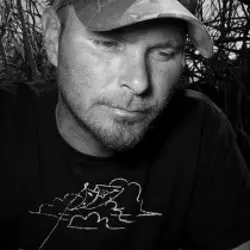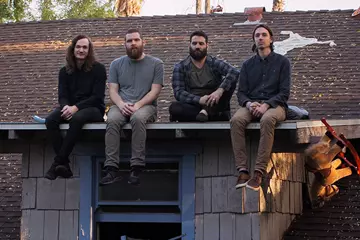 Tim Barry
Tim BarryBetween his time as frontman of punk band Avail and his ensuing solo career, Tim Barry has spent more than half of his life making a living out of music. His latest album, 40 Miler, has been receiving plenty of critical acclaim since its release in April and when asked how pleased he is with the finished product now he's had time to reflect on it, Barry is characteristically frank.
“That's the funny thing about me – when I finish a record and then once I approve the mastering I generally don't listen to it again,” he laughs. “Since I sent the mastering out from Chapel Hill, North Carolina, the day that we finished it up I've only listened to it once, and that was for reference because I was dropping some lyrics here and there, so I had to listen to a couple of songs and figure out what I'd done.
“To answer the question with that reality perfectly in place, I'm happy with the way it came out, I'm happy with the collaborations on it, I'm happy with the relaxed attitude in the studio when we recorded it. Tracking most of it live and doing it as a group, it felt really good and I'm glad some people enjoy it. There's something I understand about music and that's when you make it and present it. You can't assume that everyone's going to like what you do, so the fact that some people enjoy it stokes me out beyond belief.”
The first track on the album, Wezeltown, is an ideal choice to open the record, an upbeat slice of Americana that sets the tone perfectly for what's to come. When asked if he knew the song would lead the album as soon as he'd written it, Barry reveals he approaches tracking his releases in an interesting way.
Don't miss a beat with our FREE daily newsletter
“I'm never really sure what will start something off, but what I always strive for is to pick a song that might represent what's coming throughout the album. I have a tendency to move pretty low and pretty high at points,” he says. “I record way more songs than are possibly needed and then I'll do something that's a sort of obscure subculture in the US – I'll take the demos of the songs and get on a freight train and illegally hide in a boxcar and roll around southwestern Virginia for a little while. I'll sort of listen to the songs and decide what I like and what I don't. A song may seem to hit at a perfect spot on the record if I sequenced it the way I was thinking, and then it drops drastically low with the next song.”
One of the standout tracks on 40 Miler is Adele & Hell, a bittersweet duet that features fellow Richmond singer Julie Karr. As Barry explains, he had Karr earmarked for the song from the moment he heard her sing. “The first time I heard Julie Karr sing I was living in a shed and I was always working on carpentry projects back there. A friend of a friend had dropped off a live recording of her playing at a local eatery here in Richmond,” Barry says.
“I kept listening to it on repeat, and somewhere along the line I started listening to some old blues that same night. There wasn this whole idea of meeting this woman named Julie Karr and writing a song that was conflicting and a duet that was an argument in a sense. It all came together in my head and it took me a good long time to write. I told her, 'I'm gonna write a song that we're going to sing together', and I'm glad it really worked out; she killed it, it was really pretty phenomenal. I'm real stoked on it and she's a hell of a singer.”
When listening to the album, one gets the feeling Barry is torn between being a vagabond folk singer and his life at home, where he lives reasonably self-sufficiently. “The recordings always will have that overall theme of travel and coming back. I don't know why … I try to fight it,” Barry agrees.
“That may be the only consistency in my life; how much I leave and how much I long to get home. Right now, sitting in the backyard of my home in Richmond, Virginia, with my cat and my dog and my chickens and staring at my garden, this is a very peaceful place and somewhere I feel truly content. But all I'm thinking about is tomorrow and being in Boston and then being in Providence the next day, and the challenges and the sort of drive that keeps me moving forward.
“I'm not the type of person who always thinks backwards, but I pretty quickly learn when I get on the road that I really do miss this content peacefulness back home. I think it's always going to be a push and pull in my life. In a lot of ways I'm lucky to have that because I actually live in a city, but we have a quarter acre. I'm seriously the luckiest person in the world; both to be able to play music and to come home to a place that really does sustain me in a lot of ways.”
When asked if he ever thought he'd still be making a living out of music this far into his career, he admits it was the furthest thought from his mind when he was fronting Avail. “When I was growing up playing in punk bands there was no longevity in it, you know? After 25 years it was time to retire, and now I see bands… Shit, I opened for Stiff Little Fingers recently and the songs they were playing were from 1977 and young folks and old folks were going crazy with leather jackets on on the dance floor.
“It seems like people are playing music a lot longer than they used to. Me and a handful of other hippies that picked up their guitars to play Kumbaya have fallen into that longevity category, and I'm not sure why. It could be that people are growing up and growing with them music. In the United States the economy's so bad that people are hanging on to folk songs like it's the Great Depression days.
“If you can recall, Woody Guthrie was singing American folk songs during the depression, and once things got really good after World War Two, people stopped paying attention to him. So I figure we're next in line once the economy flips around; people are going to want to do cocaine and go to dance parties instead of listening to our hippy asses complain about everything.”















